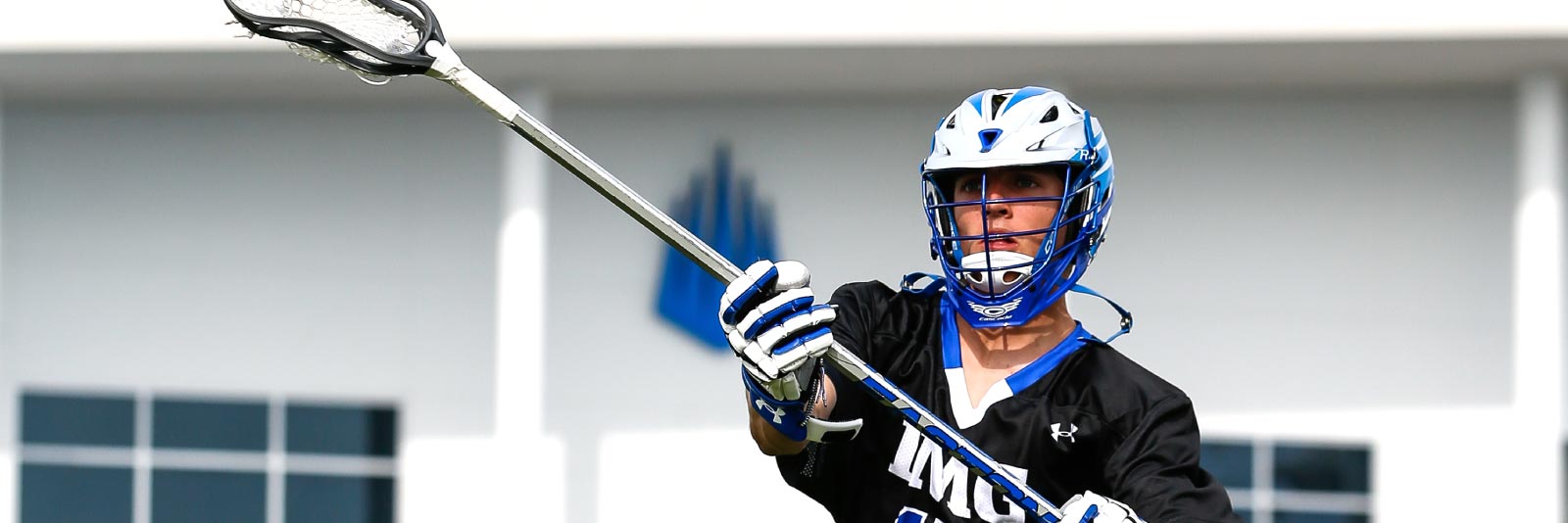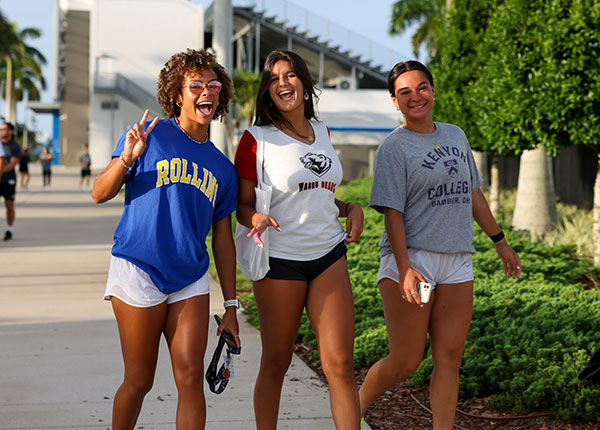“How good do you have to be to play college lacrosse?” “What do college lacrosse coaches look for in recruits?” Whether you play defense, attack, midfield and/or goalie, college coaches are looking for specific criteria and skills. Understanding what college coaches are looking for can better aid student-athletes in their search for the program that best fits their skillset.
On This Page
How good do you have to be to play college lacrosse at each division level?
- Division 1: The top 5 percent of men’s lacrosse players in the country go on to play at a Division 1 level on scholarship. Competition for Division 1 roster spots is high and requires an athlete to be well-rounded on the field and committed in the classroom. At this level, coaches have influence over admissions and will use this to secure top talent on their team.
- Division 2: Division 2 programs offer a similar level of competition as Division 1 but with fewer opportunities. The NCAA only offers 61 men’s lacrosse programs with 36 spots per team, on average. To play at this level, student-athletes need to demonstrate top level lacrosse skills and maintain high academic standing in high school.
- Division 3: Athletic scholarships may not be available at the Division 3 level, but that doesn’t mean there’s no competition for roster spots. Top end Division 3 programs recruit the same talent as Division 1 and 2 schools. Division 3 schools are known for strong academics and often recognize student-athletes with an academic scholarship. In most cases, Division 3 athletes receive the same, if not better, scholarship (financial aid) packages than Division 1 and 2. At this level, coaches have the least amount of influence over admissions.
- NAIA: The NAIA is often overlooked by student-athletes, despite being comparable to the NCAA Division 2 lacrosse programs. To compete at the NAIA level, student-athletes need to maintain a good GPA in high school and refine their lacrosse skills.
What percentage of high school lacrosse players play in college? What percentage go on to play D1?
Of the 12.6 percent of high school lacrosse players who go on to play men’s college lacrosse, three percent play at the D1 level. There are over 70 NCAA D1 men’s lacrosse programs in the US. Just over two percent of high school go on to play NCAA D2 lacrosse at one of over 60 programs. The largest percentage of high school lacrosse players, 7.2 percent to be exact, go on the play at the D3 level, which has the majority of NCAA men’s lacrosse programs at over 236 teams.
Do you have to play club lacrosse to play in college?
Yes, student-athletes who want to play college lacrosse need to play for a club lacrosse team. Club lacrosse provides student-athletes the visibility and access to college coaches that high school lacrosse does not. Club lacrosse teams compete in tournaments across the country, which college coaches attend to evaluate talent and recruit. This is especially important for student-athletes who live outside for the Northeast region where the majority of NCAA Division 1 college lacrosse programs are located and rarely have the chance to play in front of college coaches. These opportunities allow athletes to showcase their skills while competing against top talent in front of college coaches at their prospective schools. Not to mention, club coaches can be a great resource during the recruiting process, especially those with connections to college coaches.
The only exception to this is student-athletes who play lacrosse for an elite high school program that routinely sees college coaches at games.
How to play college lacrosse – what lacrosse skills are needed?
It takes more than just athleticism, technique and play memorization to impress a college coach. College coaches want athletes with a versatile skillset, high lacrosse IQ and the stamina that outlasts the game. This is true across all positions, but there are specific skills that coaches look for in goalies, attack, defense and midfield players, too. Below is a look at each of the four lacrosse positions and what college coaches look for from the D1 level to the NAIA and NJCAA.
Men’s lacrosse goalie skills and recruiting guidelines
| Tier 1 | Tier 2 | Tier 3 | Tier 4 | |
| Description | Top D1 programs | Lower D1 | Top D2 and D3 | Lower D2 and D3 |
| Club Experience | Multiple year Tournament All Star & MVP honors | All Star Honors at multiple events | All Star nominations and all tournament recognition | Multiple year participant |
| High School Experience | Top 3-5% in the country. 3-year varsity starter. All American and/or nominee. All-state selection or multiple years nominated. | Multiple seasons All State. Multiple years all region, area, county. 3-year varsity player and multiple sport varsity athlete. Club Travel team All Star Honors. | Multiple year starter and/or contributor | Multiple year member & starter |
Tier 1 Goalie NCSA Expert Notes:
College coaches at Division 1 schools have their eyes on goalies who fall under our tier 1 column. These athletes are ranked in the top five percent in high school lacrosse. Goalies at the tier 1 level have the ability to take over the game at any moment with strong communication skills and leadership of the defense. They make all “must” saves, even those that are extremely difficult and can create a fast-break scoring chance for the offense with their accurate clearing game.
Tier 2 Goalie NCSA Expert Notes:
Student-athletes whose experience falls under tier 2 are still Division 1 level athletes with a strong skillset. Goalies at this level are less consistent in the goal with flashes of greatness, while remaining stubborn in net. These athletes communicate and lead the defense in front of them, but they are not quite as strong when handling the ball in clearing game.
Tier 3 Goalie NCSA Expert Notes:
The top Division 2 and 3 schools are led by athletes with the experience and skills at the tier 3 level. These goalies have a grasp on the fundamentals in the net and handle the ball with confidence. At this level, goalies have the ability to communicate well with the defense but lack the on-field leadership that athletes at the Division 1 level demonstrate.
Tier 4 Goalie NCSA Expert Notes:
Tier 4 outlines the experience needed to play at lower end Division 2 and 3 schools. Goalies at this level are not making exceptional saves, but rather getting all the steady saves. In the net, these athletes are still strong communicators, but lack command over the defense. These athletes handle the ball often in the clearing game, but do not create as many fast break scoring chances for the offense.
Men’s lacrosse attack skills and recruiting guidelines
| Tier 1 | Tier 2 | Tier 3 | Tier 4 | |
| Description | Top D1 programs | Lower D1 | Top D2 and D3 | Lower D2 and D3 |
| Club Experience | Multiple year Tournament All Star & MVP honors | All Star Honors at multiple events | All Star nominations and all tournament recognition | Multiple year participant |
| High School Experience | Top 3-5% in the country. 3-year varsity starter. All American and/or nominee. All-state selection or multiple years nominated. | Multiple seasons All State. Multiple years all region, area, county. 3-year varsity player and multiple sport varsity athlete. Club Travel team All Star Honors. | Multiple year starter and/or contributor | Multiple year member & starter |
Tier 1 Attack NCSA Expert Notes:
Division 1 college coaches at top programs look to fill their rosters with tier 1 student-athletes each year. Top programs are looking for tough attackers who can perform on the biggest stages. At this tier, athletes have a high lacrosse IQ, great change of direction and vision, can take over a game at any point and handle the ball with confidence in high pressure situations. These athletes naturally take on the role of Quarterback of the offense and threat to score and distribute.
Tier 2 Attack NCSA Expert Notes:
Tier 2 attackers demonstrate the skills college coaches are looking for at lower end Division 1 schools. Tier 2 attackers are competitive and reliable but less flashy than tier 1 athletes. Athletes at this level are consistent with their skills, scoring and assisting. While they don’t control the game quite as well as tier 1 athletes, they show flashes of taking over games.
Tier 3 Attack NCSA Expert Notes:
To compete at a top Division 2 and 3 school, coaches are looking for athletes that are talented with room for improvement. At the tier 3 level, attackers can create offense and consistently find teammates for scoring chances. These athletes can move the ball well but make less of an impact in goals and assists.
Tier 4 Attack NCSA Expert Notes:
Athletes at the tier 4 level compete at lower Division 2 and 3 schools. They demonstrate good athleticism and quickness. Not as reliable as athletes in higher tiers, tier 4 attackers are steady contributors on offense and use their advantages well to remain a scoring threat.
Men’s lacrosse midfield skills and recruiting guidelines
| Tier 1 | Tier 2 | Tier 3 | Tier 4 | |
| Description | Top D1 programs | Lower D1 | Top D2 and D3 | Lower D2 and D3 |
| Club Experience | Multiple year Tournament All Star & MVP honors | All Star Honors at multiple events | All Star nominations and all tournament recognition | Multiple year participant |
| High School Experience | Top 3-5% in the country. 3-year varsity starter. All American and/or nominee. All-state selection or multiple years nominated. | Multiple seasons All State. Multiple years all region, area, county. 3-year varsity player and multiple sport varsity athlete. Club Travel team All Star Honors. | Multiple year starter and/or contributor | Multiple year member & starter |
Tier 1 Midfield NCSA Expert Notes:
Tier 1 midfielders possess the skills and experience needed to play at the top Division 1 lacrosse programs. These athletes are dominating on the field with great vision and exceptional defensive skills. They excel at faceoffs and transitions and are strong two-way midfielders who demand double teams when on offense and can create offense at will.
Tier 2 Midfield NCSA Expert Notes:
Just slightly less skilled and experienced than tier 1 midfielders, tier 2 middies are great athletes who move the ball and consistently contribute on the score sheet. They are less dominating than tier 1 athletes but still demand extra attention on the offensive end and provide solid defense and faceoff performance.
Tier 3 Midfield NCSA Expert Notes:
Athletes at top Division 2 and 3 programs most align with the skills and experience of tier 3 midfielders. Good athletes with a grasp of their role on the field, tier 3 middies find ways to be a difference maker, dodger and feeder. Midfielders at this level are not as able as those in higher tiers but show flashes of the ability to be the go-to player.
Tier 4 Midfield NCSA Expert Notes:
Tier 4 athletes generally best fit with lower end Division 2 and 3 programs that recruit talented athletes with room for improvement. Midfielders at this level are less versatile and tend to find a niche that they’re truly good at. They are strong contributors on offense that serve as a threat in transition. They are not a top scorer but occasionally create scoring chances.
Men’s lacrosse defense skills and recruiting guidelines
| Tier 1 | Tier 2 | Tier 3 | Tier 4 | |
| Description | Top D1 programs | Lower D1 | Top D2 and D3 | Lower D2 and D3 |
| Club Experience | Multiple year Tournament All Star & MVP honors | All Star Honors at multiple events | All Star nominations and all tournament recognition | Multiple year participant |
| High School Experience | Top 3-5% in the country. 3-year varsity starter. All American and/or nominee. All-state selection or multiple years nominated. | Multiple seasons All State. Multiple years all region, area, county. 3-year varsity player and multiple sport varsity athlete. Club Travel team All Star Honors. | Multiple year starter and/or contributor | Multiple year member & starter |
Tier 1 Defense NCSA Expert Notes:
To compete at the Division 1 level for a top program, defensemen must have more than just great on-ball skills, physical presence and technical skill. To be a tier 1 defense player, student-athletes take control of the game, the competition’s top offensive player and the defenders around them. They handle the ball often and are a threat in the clearing game.
Tier 2 Defense NCSA Expert Notes:
Tier 2 defensemen are still at the top of the talent pool, but their skills and experience are better suited for a lower end Division 1 program. Athletes at this level play a steady mix of groundball play and 1 vs. 1 defense. They are not always the top defensive player but show flashes of taking on that role with great athletic ability. They can cover the top tier offensive threats with steady influence on the player.
Tier 3 Defense NCSA Expert Notes:
Top ranked Division 2 and 3 programs look for student-athletes who just missed making a Division 1 team. Tier 3 defensemen are a solid contributor that can both handle the ball and cover strong offensive threats. These athletes identify a role on the field that they can succeed in and perform it well.
Tier 4 Defense NCSA Expert Notes:
Less skilled than defensemen in the top three tiers, athletes with the skills and experience that match the tier 4 level can compete at lower end Division 2 and 3 schools. These are good, not great, athletes who steadily contribute in team concepts and help defense. They are decent communicators that have an understanding of their advantages and use them very well.
Does height and player size matter in lacrosse?
While some college sports have very specific height and size requirements, there requirements are less definitive when it comes to men’s college lacrosse. College coaches do still reference the guidelines for average height and size, but do not let these guidelines restrain them in the recruiting process. Over the years, college coaches have seen time and again that skill, competitiveness and confidence make a great player, with or without the physical stature.
What is lacrosse IQ? How does it factor into getting recruited?
There’s more to a top tier lacrosse athlete than just athleticism and skill. What sets apart a good player from a truly great player is Lacrosse IQ. Lacrosse IQ is an athlete’s ability to understand strategy, observe and assess the situation and use past experience to know what action to take and when. During showcase, at prospective camps and in highlight video, college coaches look beyond an athlete’s athletic ability to assess their lacrosse IQ. Does the athlete understand the strategy behind a play or are they just doing as instructed? Does the athlete evaluate a situation before taking action? Is the athlete experienced enough to know when and how to take action in various situations?
What do coaches look for in your lacrosse recruiting video?
Student-athletes have just minutes to capture a college coach’s attention in a recruiting video. It’s important that those few minutes are packed with clips that showcase what college coaches are looking for. So, what do coaches look for in your lacrosse recruiting video? There are three elements that all lacrosse recruiting videos should include; versatility, lacrosse IQ and athleticism.
Versatility: Avoid a reel of the same handful of play. College coaches want to see a variety of plays, demonstrating more than one skill.
Sport IQ: It’s far easier to find an athlete that can learn and execute plays. Student-athletes can stand out by including footage that highlights their ability to evaluate a situation, develop a play and position themselves to successfully make the play.
Athleticism: Most lacrosse players possess some level of athleticism. What coaches are really looking for is an athlete with stamina, strength and agility.
Get tips for making a great lacrosse highlight video.
Where do college coaches go to recruit lacrosse players?
The best way for college coaches to assess a student-athlete’s talent is to watch them in person at club tournaments, college camps, third party camps and high school games. These platforms play a crucial role to the recruiting process for both college coaches and athletes. While student-athletes focus on developing and demonstrating their skillsets through instruction, drills and competition, college coaches assess athletes’ athleticism, sports IQ and versatility. Another benefit of attending tournaments and camps and playing in high school games is the opportunity for coaches to connect with athletes and get a feel for their character.


